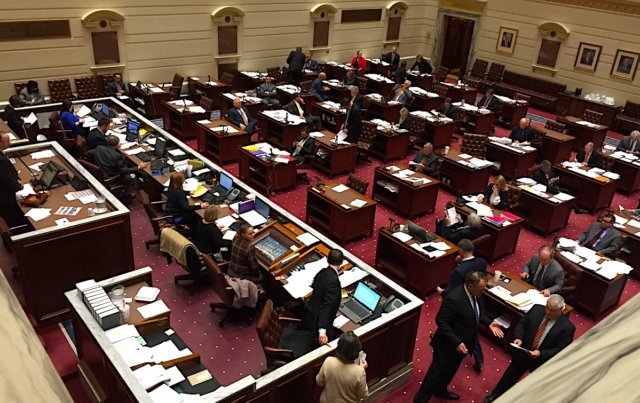
An hour and a half after sundown, the Oklahoma State Senate took up a series of measures to pay for a 12.7 percent increase in the minimum pay allowable for a public school teacher, but the body failed to hit the magic number for new revenue. The vote remained open for more than an hour.
Senators advanced two of the three bills that, taken together, represented a pared-down version of past efforts in the last nine months. SB 861 (42-4) and SB 133 (35-11) both advanced, but an amended HB 1033XX stalled at 34-12, two votes short of the three-fourths majority needed for revenue-raising measures.
All eight Senate Democrats voted against HB 1033XX, as did the body’s four most conservative Republicans. Two senators were absent: Sen. Rob Standridge (R-Norman) and Sen. Joe Newhouse (R-Broken Arrow), a deployed member of the U.S. Navy Reserve.
The new version of HB 1033XX included:
- $1 new tax on cigarettes
- $0.06 new tax on gasoline and diesel
- an increase in the gross production tax incentive rate on all wells from 2 percent to 4 percent
That made the bill essentially the same as “Plan A+” which passed the Senate and fell five votes shy in the House on Nov. 8, though its cigarette tax is $0.50 lower and other tobacco tax hikes are not included.
SB 861 would restore the refundability of the Earned Income Tax Credit. The Legislature repealed its refundability — meaning a payout beyond exemption — in 2016.
SB 133 would set a new minimum pay scale for public school educators that is 12.7 percent higher than the current pay scale. A first-year teacher with only a bachelor’s degree currently cannot make less than $31,600. Under this proposal, that minimum salary would be set at $35,613. Teachers with 20 years of experience would go from a $43,875 minimum to $48,980. Those increases would range between $4,013 and just more than $5,000. The Oklahoma Education Association requested a $6,000 raise for next year as well as additional raises for support staff and additional classroom funding.
‘This bill falls short’
Senate Minority Leader John Sparks (D-Norman) debated against the revenue bill.
“We have voted in favor of proposals before, and we will again when we think they hit the targets,” he said. “The targets laid out for us now have been laid out by the education community.”
Sparks said lawmakers need to listen to what educators say they need in terms of resources.
“This bill falls short of that,” he said. “It does not provide for support staff that we’ve lost over the years. It does not provide for operations. It does not provide for us to have a way to move from four-day school weeks.”
Sen. Roger Thompson (R-Okemah) debated in favor of the revenue bill.
“Whenever we spend our lifetime looking for the perfect, we miss out on the good,” Thompson said. “We’re not making an empty promise. If you support this bill tonight, there is certainty that teachers will receive a 12.7 percent across-the-board pay raise.”
Senate Majority Leader Greg Treat (R-OKC) said Republicans have listened to Democrats who proposed a lower cigarette tax. He urged the entire Senate to vote in favor.
“If you vote against this, you will have a lot of unanswered questions from your district,” Treat said.
PREVIOUSLY:
Seeking resolution: Tax plans emerge ahead of April 2 by William W. Savage III






















